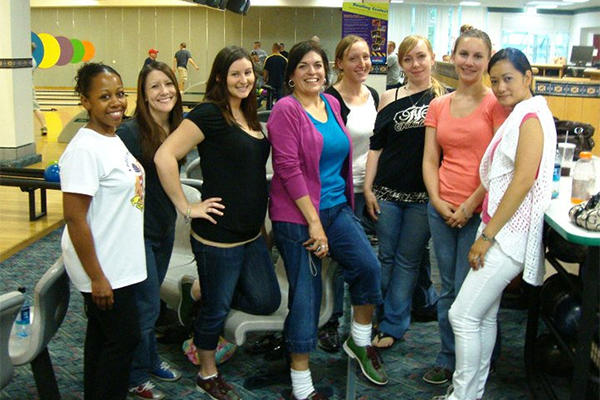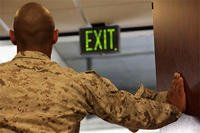GRAFENWOEHR, Germany -- It was my first day of volunteering -- just two weeks into my husband's military service -- when I overheard people exchange critical comments about the FRG, or Family Readiness Group, the Army's primary family organization.
Perhaps the most complex and elusive program in the Army, the FRG is also one of the most important resources for the new spouse and novice soldier. Nevertheless, negative stereotypes circulate community buzz. Often, the military's newest members are reluctant to get involved, dismissing the organization as irrelevant or a waste of time.
My opinion of the FRG began to shift after I attended my first meeting. Who were these women standing in front of 200 or more family members and soldiers, briefing us on future unit operations, organizing company-wide events? Why would they volunteer for such a daunting and time-consuming task -- especially one very few people actually appreciated?
Related: How to Join a Family Readiness Group
I decided to do some digging and met one-on-one with several FRG leaders in the Bavarian community. We talked about individual life backgrounds, the truth behind filling the leadership position, thoughts on the future of FRG, and, yes, even the stereotypes that thwart the organization's success.
The FRG leader is, more often than not, a mom, lugging around diapers and parenting teenagers. Many have full-time jobs or manage their own home-based business. All of the leaders have personal ambitions in their chosen professions, and most have a bachelor's or master's degree. Some are spouses of the commanding officer, but most are spouses of lower enlisted soldiers or civilians. Well attended or not, all volunteer at least 40 hours every week to support their FRG.
They attend lengthy leadership trainings, leaf through stacks of Army regulations, triple-check information before formatting it in a weekly newsletter, organize single soldier dinners, visit families at the hospital and support mothers through the unique challenges of children with special needs.
When asked about the reason for becoming FRG leader, several senior spouses cited overwhelming social pressure as a leading influence. Other reasons for filling the leadership position included a sincere eagerness to support the families and soldiers of their unit.
"If my husband wasn't the company's commander, I probably wouldn't have stepped up," explained a spouse. "It takes a special person to do that, and I don't think people are generally inclined to come up and say, 'I'll do it.' "
Both senior and new military spouses said they were determined to make their FRG different, despite negative experiences with FRGs in the past. Their stories involved tragic instances of misinformation regarding deployment returns and injuries. One leader's previous FRG coldly refused to provide any information about the severe injuries suffered by her soldier during deployment, simply because she was his girlfriend at the time.
"I'd heard from people that FRGs are terrible -- steer clear. Others said to definitely go. But even if I wanted to get involved, they weren't super welcoming," she said. "Even now, FRGs are not really girlfriend-friendly."
All of the leaders admitted that realization of their FRG visions has been exceptionally challenging. Many knew FRG leaders who quit because working and volunteering meant less time with their families. Others were burnt out and discouraged. Less extroverted FRG leaders talked about their struggles with public speaking and building friendships and community connections.
"I became involved with the FRG because I felt like I was supposed to, in order to support my husband's Army career. I was hesitant to get involved, and I wasn't sure I'd 'fit in' with the ladies," an FRG leader said. "I'm an introvert, so not joining a large group is actually easier than jumping into it."
According to Mark Haire, Mobilization and Deployment Specialist and FRG community activist, the Army-wide FRG has undergone several major facelifts since its origin in the 1980s. The most pivotal turning point, however, was Sept. 11, 2001, which left many FRG leaders ill-equipped for the rapid mobilization of units and soldiers' back-to-back deployments.
"It was when Operation Iraqi Freedom started," recalled a spouse who married into a senior position. "When our unit deployed, we didn't hear anything. People called me in the middle of the night, yelling and telling me that I should know more. I'm like, 'No, no I don't know. I'm upset too.' I think people thought that, as the commander's wife, I was being mean. I also think the stress of wartime brings out the worst in everyone. I continued to help the new FRG leader, but I couldn't do it by myself anymore."
The greatest obstacle to success, according to the FRG leaders, are the stereotypes labeling the organization a "time waster" and "drama club" and the assumptions people make about senior spouses.
"We truly care about the families. It's why we volunteer," a spouse said, later adding, "It's getting people to believe in it like you do -- that's the hardest part."
The FRG is a command-sponsored program, subject to both ACS Army Regulation 608-1 and Command Army Regulation 600-20. According to the regulations, the organization is a resource for all constituents of a company and not simply a generator of solidarity or entertainment.
"It is an official information channel. The leader is an official resource director," said Haire. "Its primary intent is to build company resiliency. It is not a morale, welfare or recreation program. Birthdays, baskets, parties -- they are not the priority. These are extra events, and they should form naturally."
Several of the FRG leaders want to redefine the meaning of the organization. They want to build a supportive social network for spouses and families, create a family-like environment for single soldiers and organize fun events that unite the entire unit. Their vision requires teamwork and is fundamentally about grass-roots altruism in the midst of global military operations.
"The FRG is evolving," said Haire. "The number of people at an FRG meeting is not an indication of how successful the FRG is. As long as the leader is in some way connected to the community -- through email, Facebook -- that's a success. They really try to help people be more resilient, and I'm talking real world stuff: mental issues for children, resources for budgets, information about legal rights."
When asked about FRG stereotypes, leaders did not discredit the truth behind some of these claims, but insisted that it is definitely the minority.
"I hope people think, 'Oh wow, I want to give her a shot. I see she's really trying,' " one of the newest members of the FRG crew said. "I never give up on the families. I know it's a great group."











